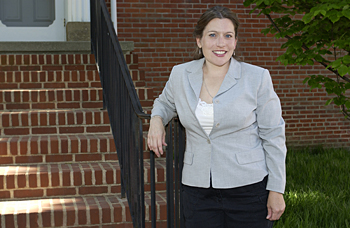Armiger has received a $20,000 American Fellowship from the American Association of University Women (AAUW), one of 63 such fellowships awarded nationally. Candidates are evaluated on the basis of scholarly excellence, teaching experience and active commitment to helping women and girls through service in their communities, professions or fields of research. While scholars engaged in researching gender issues are encouraged to apply for the fellowship, Armiger's adviser, Arwen Mohun, associate professor of history, noted that the bulk of the fellowships are awarded in the sciences in a concerted effort by AAUW to encourage women in fields in which they are underrepresented.
“The fact that Jennifer received one of these awards says that AAUW recognizes the significance of her work and her potential as a future academic leader,” Mohun said.
In addition, Armiger was offered a $14,000 University of Delaware Dissertation Completion Award from the Office of Graduate Studies, which she had to turn down to accept the Women's Studies Dissertation Completion Award, a $14,000 award newly established by the dean of the College of Arts and Sciences to encourage interdisciplinary research on women.
Armiger's interest in the history of women and labor in post-industrial America was born of her own experiences as a self-described “New Jersey working girl.” She worked as a waitress and in clerical positions to finance her undergraduate education at the College of New Jersey. After graduating in 1999, she took a position as a research associate with a financial firm in Princeton, N.J. During this time, Armiger also became active in the National Organization for Women (NOW), eventually becoming president of her local chapter.
“Two years in corporate America convinced me that it was time to send in those applications to grad school,” Armiger said. “I had many questions about the things I had experienced in the working world--sexual harassment and gender segregation and the wage gap--and it fit in with questions my professors had raised in my mind about women's history and labor history. I was unsatisfied with work, even though I was doing well, and it spurred me to put my passions into action.”
On her first visit to the University of Delaware, she met Mohun, her future adviser, who encouraged Armiger to apply to the Hagley Graduate Program at UD, a premier graduate program that focuses on the history of technology, work, business, consumption and industrialization. Students in the program benefit from ties to museum studies and material culture programs at the University, as well as the Hagley Museum and Library in Wilmington.
Armiger said that Roger Horowitz, associate director of the Center for the History of Business, Technology and Society at the Hagley Museum and Library, first mentioned the oral history project under way among the parties involved in the Western Electric case that eventually became Armiger's dissertation topic. A long-standing academic adviser to Armiger, Horowitz also served as a member of her dissertation committee.
“I had wanted to do something with women and work in the 1970s,” Armiger explained. “With all the momentum of the feminist movement of the 1960s, I wanted to know why we were still fighting these persistent issues. I am using this case to discuss why we didn't see equal employment opportunities unfold the way we thought they would when Title VII of the 1964 Civil Rights Act first outlawed sex discrimination in the workplace.”
Mohun praised the way Armiger approached the subject, a complex case involving mounds of legal files. “It took a huge amount of diligence and imagination to turn this mass of legal documents into something that would be meaningful to scholars as well as interpreting it in a way that would be interesting for anyone else to read,” Mohun said. “She's one of those students who always exceeds your expectations, and she's accomplished this while cheerfully facing a number of obstacles. She's just a very remarkable student and a remarkable person.”
Halfway through her dissertation project, Armiger's life took an unexpected turn when she learned she was pregnant. It was an occasion for much soul searching as she wondered whether she should continue her graduate studies.
“Graduate fellowships, especially in the humanities, usually aren't quite enough to make ends meet,” she said. “That's all right when it's just you, but when you have to support someone else, you start to wonder if you have a right to stick with it when you could be doing something else to earn more. That's why when I write a fellowship application, the stakes are really high.”
Daycare for her son, Troy, now three years old, has been an added expense, but fortunately, Armiger has been able to continue her studies without interruption, supplementing her income with summer employment and substitute teaching. Her recent awards mean she will be able to devote herself full-time to writing her dissertation in the coming year. Once she receives her doctorate, she hopes to launch an academic career. She has already been nominated twice for graduate student teaching awards at the University. She also remains active in NOW, and currently serves on the executive board of New Jersey NOW as vice president for leadership.
“I look forward to working with students in the classroom setting, the real front lines of history,” Armiger said. “In addition to an academic career, I hope to pursue a career in politics and public policy at some point. While I believe strongly in research and teaching as some of the most important work that we can pass on to others, I am deeply invested in the notion of active civic engagement and social advocacy. We are not just individuals in a consumer nation, but citizens of a republic and indeed a global community. We must think deeply about our legacy and what story we want future historians to tell of us.”
Article by Beth Chajes
Photo by Tyler Jacobson



